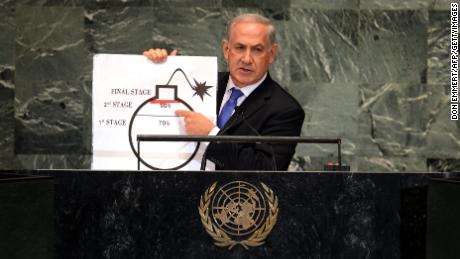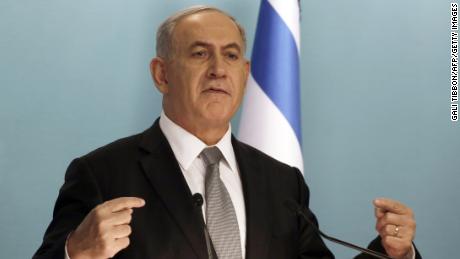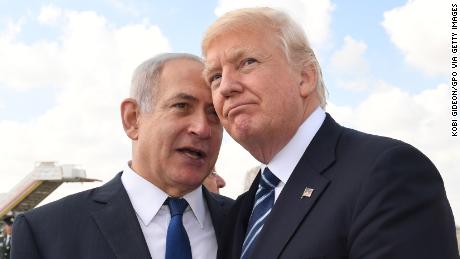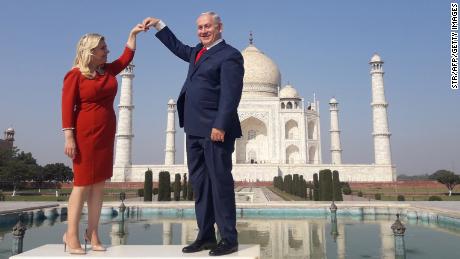Story highlights
- White House sees indications the Israeli leader is working to mend fences in U.S.
- All sides are hopeful the visit will be less contentious than Netanyahu's March trip
- Prime Minister then publicly lobbied against Iran deal in address to Congress
Washington (CNN)Israeli Prime Minister Benjamin Netanyahu returns to Washington on Monday seeking to mend his relationship with President Barack Obama after the Israeli leader's controversial address on Iran to Congress eight months ago soured ties between the two allies.
Expectations for the visit aren't high: U.S. officials said no final agreement is likely on new U.S. defense aid to Israel, and they conceded the possibility of negotiating a two-state peace deal with the Palestinians is off the table for the remainder of Obama's time in office.
But the White House does see indications that the Israeli leader is working to mend fences in the United States and attempting to move away from politics in bilateral ties that both countries insist must transcend domestic party lines.
"There are occasions when we've had disagreements, and that's well-known about this past year, particularly around the Iranian negotiations," said Dan Shapiro, the U.S. ambassador to Israel, on Thursday. "But I think both Prime Minister Netanyahu and President Obama are clearly focused in the meeting we're preparing for next week on looking forward."
All sides are hopeful that the visit will be less contentious than in March when the Prime Minister infuriated the White House by publicly lobbying against the Iran agreement in an address to Congress -- something the administration maintained was a breach in diplomatic protocol.
Netanyahu's effort to thwart the deal was ultimately unsuccessful since congressional opponents of the pact were unable to scuttle it.
Now, with the agreement in place and Netanyahu re-elected to another term in office, officials in Jerusalem and Washington are looking to move past the spat.
"There's been a lot of damage done that's continued through the summer and the fight over the Iran deal," said Jeremy Ben-Ami, president of the liberal Israel advocacy group J Street. "There's some hope by the Prime Minister that he can begin to repair some of that damage. It's going to take a little more than a photo op at the White House or a couple of speeches at Washington think tanks to try to actually mend some of these fences."
There have been glimmers of rapprochement in the rift between Obama and Netanyahu. Last month, when Netanyahu spoke at the annual U.N. gathering of world leaders, his bombastic speech railing against the Iran nuclear deal also contained some rare, if limited, measures of praise.
"This deal does place several constraints on Iran's nuclear program. And rightly so, because the international community recognizes that Iran is so dangerous," he said in the speech, which also included a dramatic 45-second pause -- a reflection, he said, of U.N. silence in responding to Iran's threats to Israel.
Even amid the dire warnings about the Iran accord, Netanyahu acknowledged the deal wasn't being retracted. He lobbied for maintaining strict inspections and snap-back sanctions should Tehran violate the pact, as spelled out in the agreement's text.
Israeli Defense Minister Moshe Ya'alon was more blunt later in October.
"The Iran deal is a given," Ya'alon said alongside his U.S. counterpart, Ashton Carter, at a press conference in Washington. "Our disputes are over. And now we have to look to the future."
Next week, Netanyahu will speak at the conservative American Enterprise Institute but also the liberal think tank Center for American Progress, a group with deep ties both to Obama and Democratic presidential candidate Hillary Clinton.
Progressive American Jews, along with the White House, see the Israeli leader's remarks to the left-leaning organization as an indication that Netanyahu is looking to repair a damaged relationship with Democrats. They said that the Prime Minister's words to the group will be the true indicator of his willingness to foster better ties with the American left.
"The onus is on the Prime Minister to try to repair some of the damage that's been done," Ben-Ami said.
But even as signs pointed toward a peacemaking trip, countercurrents of dissension between the two leaders were continuing to emerge.
On Thursday, Netanyahu was distancing himself from his newly appointed head of public diplomacy after the discovery that the aide, Ran Baratz, suggested Obama was an anti-Semite in a March Facebook post.
Baratz apologized for the statements, which Netanyahu and other Israeli leaders condemned. Secretary of State John Kerry, whom Baratz insulted in a separate post as having a low intellect, received a personal phone call from Netanyahu to discuss the matter.
American officials sought to downplay the effect the language would have on Netanyahu's visit and said it was the prerogative of the Israeli government to determine who serves in official posts.
But another source of tension between the two leaders -- the laborious attempts at peace negotiations between Israeli and Palestinians -- looks to have been put on the back burner as American officials noted they were doubtful any agreement could be reached before Obama leaves office.
Obama's desired plan would result in the formation of a separate Palestinian state. And while that remains his preferred outcome, his aides said Thursday he's arrived at a "realistic assessment" that such a solution is impossible in his remaining 15 months.
Instead, officials said Obama will lobby Netanyahu at least to preserve the possibility that the next U.S. president could make another attempt at achieving a two-state solution.
"This is really the first time since the first term of the Clinton administration where we have an administration that faces a reality where the prospect of a negotiated two-state solution is not in the cards in the time that's remaining," Rob Malley, Obama's Middle East coordinator, said Thursday.
"The President has reached the conclusion that right now, barring a major shift, the parties are not going to be in the position to negotiate a final status agreement," Malley added.
Pressed about that conclusion Friday, White House Press Secretary Josh Earnest said Obama based his thinking on Netanyahu's own assessment of the situation in his country.
"The leaders of the Israeli people and the Palestinian people are ultimately going to be responsible for making the difficult decisions that will finally resolve this conflict," he said. "Based on the comments of the Prime Minister of Israel, that seems not likely to occur over the course of the next 15 months."
















































































































